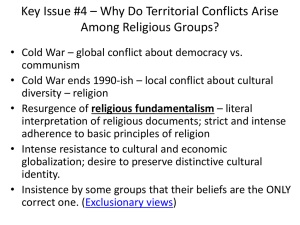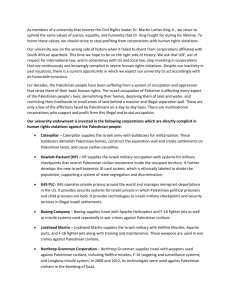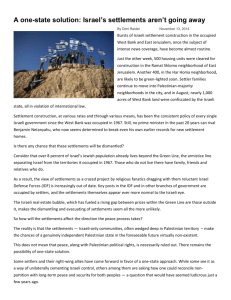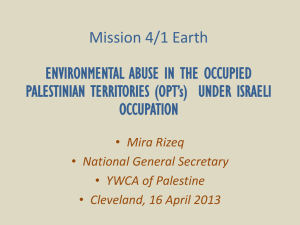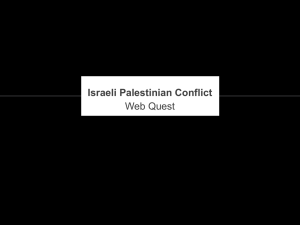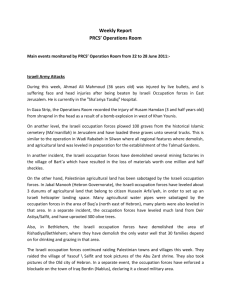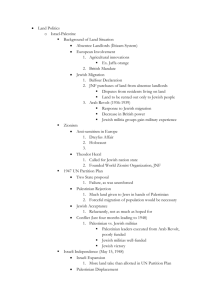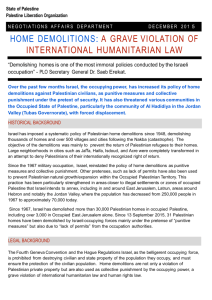Palestinian-Workers-in-Israeli-West-Bank
advertisement
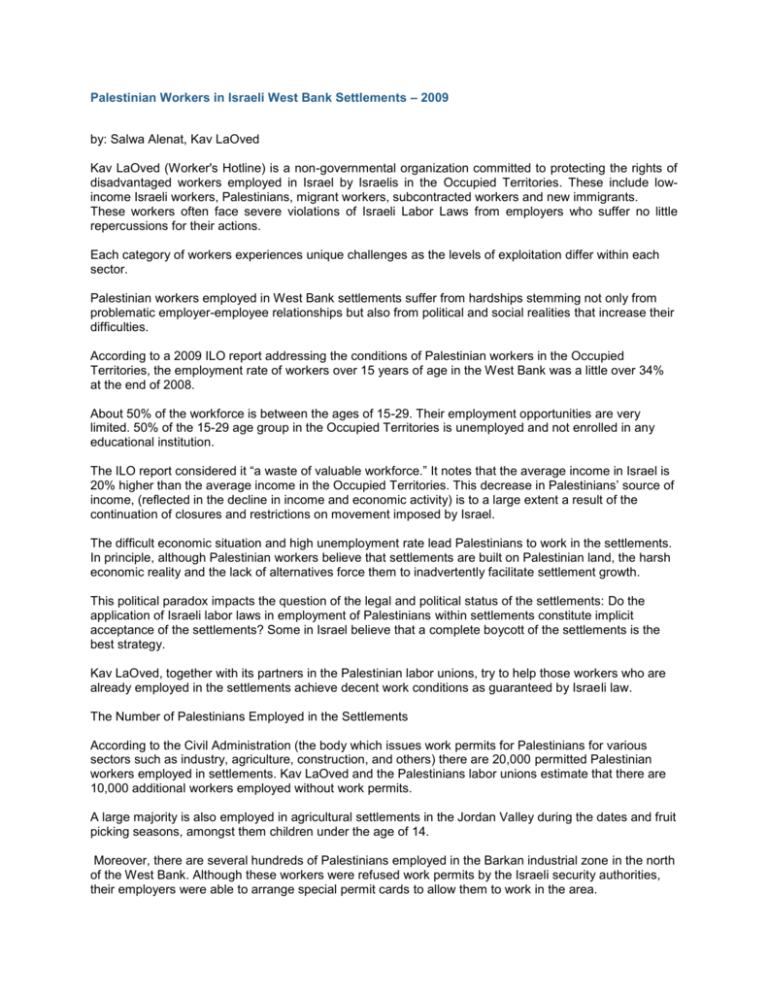
Palestinian Workers in Israeli West Bank Settlements – 2009 by: Salwa Alenat, Kav LaOved Kav LaOved (Worker's Hotline) is a non-governmental organization committed to protecting the rights of disadvantaged workers employed in Israel by Israelis in the Occupied Territories. These include lowincome Israeli workers, Palestinians, migrant workers, subcontracted workers and new immigrants. These workers often face severe violations of Israeli Labor Laws from employers who suffer no little repercussions for their actions. Each category of workers experiences unique challenges as the levels of exploitation differ within each sector. Palestinian workers employed in West Bank settlements suffer from hardships stemming not only from problematic employer-employee relationships but also from political and social realities that increase their difficulties. According to a 2009 ILO report addressing the conditions of Palestinian workers in the Occupied Territories, the employment rate of workers over 15 years of age in the West Bank was a little over 34% at the end of 2008. About 50% of the workforce is between the ages of 15-29. Their employment opportunities are very limited. 50% of the 15-29 age group in the Occupied Territories is unemployed and not enrolled in any educational institution. The ILO report considered it “a waste of valuable workforce.” It notes that the average income in Israel is 20% higher than the average income in the Occupied Territories. This decrease in Palestinians’ source of income, (reflected in the decline in income and economic activity) is to a large extent a result of the continuation of closures and restrictions on movement imposed by Israel. The difficult economic situation and high unemployment rate lead Palestinians to work in the settlements. In principle, although Palestinian workers believe that settlements are built on Palestinian land, the harsh economic reality and the lack of alternatives force them to inadvertently facilitate settlement growth. This political paradox impacts the question of the legal and political status of the settlements: Do the application of Israeli labor laws in employment of Palestinians within settlements constitute implicit acceptance of the settlements? Some in Israel believe that a complete boycott of the settlements is the best strategy. Kav LaOved, together with its partners in the Palestinian labor unions, try to help those workers who are already employed in the settlements achieve decent work conditions as guaranteed by Israeli law. The Number of Palestinians Employed in the Settlements According to the Civil Administration (the body which issues work permits for Palestinians for various sectors such as industry, agriculture, construction, and others) there are 20,000 permitted Palestinian workers employed in settlements. Kav LaOved and the Palestinians labor unions estimate that there are 10,000 additional workers employed without work permits. A large majority is also employed in agricultural settlements in the Jordan Valley during the dates and fruit picking seasons, amongst them children under the age of 14. Moreover, there are several hundreds of Palestinians employed in the Barkan industrial zone in the north of the West Bank. Although these workers were refused work permits by the Israeli security authorities, their employers were able to arrange special permit cards to allow them to work in the area. Within Israel, there are another 20,000 Palestinians workers, mostly in agriculture and construction. There are also thousands of workers who enter Israel illegally and work without permits. In the last few years however, the number of Palestinians employed inside Israel has diminished due to restrictions on movement, decline in economic situation in Israel and the increase in hiring of foreign workers. At the same time though, the number of Palestinian workers in the settlements has risen. Exploitation of Workers Palestinian workers are severely exploited in the settlements. Kav LaOved leads a project aimed at assisting workers employed in the agricultural settlements in the Jordan Valley and in settlement industrial zones such as: Mishor Edomim near Jericho; Barkan near Salfit; Shahak near Jenin; Nitzanei Hashalom near Tulkarem; Alei Zahav; Emanuel; Karnei Shomron and Alfei Menashe in the Qalqilya area. There are 20 such settlement industrial zones, employing about 5,000 regular workers and thousands of temporary and seasonal workers employed through Palestinian contractors. Most of the Jordan Valley agricultural product is exported to Europe. According to Israeli law, Palestinian workers are entitled to employment terms and rights as guaranteed by Israeli labor laws. Based on a 2007 Supreme Court ruling, they should enjoy the same rights as Israeli workers. This ruling was a result of a 14 year struggle led by Kav LaOved in the Israeli Labor Court. The length of the struggle and the persistent resistance of the State of Israel to the application of Israeli labor laws in the settlements reflected the State’s preference to maintain low labor costs in the settlements. A cheap and available workforce was an incentive for Israelis and foreigners to invest in the settlements. In the two years that have passed since the extension of Israeli labor laws to the settlements, several changes are apparent – some due to the application of the laws and some to other factors on the ground. 1. Low Wages and No Social Rights Workers’ wages have increased, but have not reached the Israeli minimum wage (currently 20.7 NIS per hour). Generally, Palestinian agricultural workers receive a third of the minimum wage, 50-60 NIS ($15) for an eight hour work day. This also applies to children employed during the picking season. No dramatic change in workers’ wages took place in the agricultural sector. By contrast, in the industrial zones workers receive about two thirds of the minimum wage, around 80-120 NIS per day. Workers in several factories who demanded a raise were pacified by a few additional shekels. A related phenomenona is the filing of multiple lawsuits by workers against their employers in the industrial zones. In the past 3 years, Kav LaOved has accompanied 5 cases of factory workers who sued their employers. These lawsuits demanded the application of labor laws in the work place, in particular payment of minimum wage and related social rights such as sick days, vacation days, holidays, etc. Most of these lawsuits are still being discussed in labor courts. The lawsuits, alongside tens of private suits, powerfully reflect the changes in employment relationship between Palestinian workers and their Israeli employers in the settlements. The workers used to regard themselves as second class workers because they were not Israeli. They believed that their Israeli employers were doing them a favor by hiring them. Over time, the workers came to see themselves in a different light- as equal and as deserving of decent employment. This transformation occurred as a result of Kav LaOved and the Palestinian labor unions’ education regarding Israeli labor laws and workers’ rights, and these organizations’ legal assistance to workers in areas such as Jericho, Jenin, Tubas, Salfit, Qalqilya and Tulkarem. Collective lawsuits have a tremendous impact. On the one hand, they articulate a collective protest by workers against violations in the workplace. On the other hand, they are a serious blow to the employers; in two work places – a laundry and a quarry – employers came close to shutting down the operations in the settlements due to lawsuits filed by workers and the high costs involved. As a result of the rise in lawsuits in labor courts, employers withheld documents that might serve as evidence in court, such as paystubs, from their workers especially in factories. In the few places where paystubs were distributed earlier, employers started withholding them following the Supreme Court ruling regarding the application of Israeli labor laws. In other cases, employers falsified information in paystubs regarding the number of hours and days worked by workers and did not note overtime hours. In this way, paystubs falsely reflected a payment of minimum wage to workers, while in fact workers received a much lower wage. One of the prominent cases took place in the Maale Adumin municipality, a settlement in East Jerusalem, which employed about 80 Palestinian workers. The municipality argued that the Jordanian labor law should apply to its Palestinian workers. The workers, who were fired due to a labor dispute, argued that they should be granted the rights guaranteed by Israeli labor laws. Similarly, in a factory located in the Mishor Edomim industrial zone and owned by the Israeli company Even Bar Ltd. employers argued that workers should be compensated according to the Jordanian labor law. In many cases, employers forced their workers to sign documents in Hebrew relinquishing the rights owed to them. Workers who refused to sign the documents were threatened with dismissal. In one factory, a worker who was forced to sign a document in Hebrew wrote in Arabic “mish aref” (I don’t know)! Legally, these documents are not admissible as evidence in labor courts. ______________________________________________________________ 2. Employment through Palestinian Contractors In the Jordan Valley settlements, employers utilize Palestinian contractors, a common practice in the last 20 years. Over this period, the contractors have established themselves as integral middlemen between employers and workers. The workers often do not even know the name of their Israeli employer. The contractor’s job is to bring workers to work when needed, to pay them and to make sure they do not demand a raise. In most cases, contractors fire workers, change the workers’ workplace and prevent them from demanding their rights. On their part, workers perceive the contractor as a sort of employment agency which can find work for them. Workers and contractors compete for the limited jobs available in the settlements. Following the Supreme Court ruling, employers in the Jordan Valley have tried to present the contractors themselves as the workers’ employers. The have required contractors to fill out employment tax forms for workers, a task which is the responsibility of the employer. Furthermore, in some cases the contractor’s name was written under ‘employer’ on workers' permits. The employers ignored workers’ demands for raises and referred them to the contractors as the appropriate address for such matters. Kav LaOved, together with the Palestinian labor unions in Jericho, initiated a dialogue with some contractors who refused to separate their salary from the salaries of the workers and in this way appropriated an unknown sum of the workers’ salaries. Many Israeli employers in the Jordan Valley admit that they do not pay minimum wage, but justify the practice by arguing that the Palestinian workers in the settlements earn more than workers in the Palestinian Authority. In some of the industrial zones, factories began employing their workers through contractors. In a few cases workers were able to prevent this practice by resisting the introduction of contractors. These workers were senior, professional and united and thus were able to pressure their employers through threats of strike. On another occasion, the Palestinian labor union branch in Tulkarem was able to prevent a contractor from entering a factory by leveraging social pressure. Employment through Palestinian contractors is a significant challenge. Changes to patterns of employment, especially in the Jordan Valley, will lead to profound social changes. The contractors often hold a high social status, they employ their family members and it is hard for others to question the authority they have acquired over the years. In one of our workshops for women in the Jordan Valley village of Zbidat, the 20 female workers present complained about a low wage of 60 NIS for a day of work. When we explained that they needed to pressure the contractors they replied: “These are our brothers, we cannot raise claims against them.” 3. Mistreatment of Injured Workers When injured, most workers have to go to the nearest Palestinian hospital by themselves. Others are evacuated by MADA, the Israeli emergency medical service to the nearest checkpoint where they are then transferred to a Palestinian Red Crescent ambulance and driven to a Palestinian hospital. In all of these cases, workers should have been entitled to medical treatment in Israel. Example: the case of Ali Abu Ara, an agricultural worker in the Jordan Valley settlement Mechora. On the 24th of November, 2008 at 10:30am, he was cut in his left hand while working in a date grove. He bled for 15 minutes, until the Palestinian contractor drove him to the Palestinian hospital in Nablus, which he reached only at 6pm due to the multiple procedures at the checkpoints. The worker claims that no ambulance was called to the workplace. The employer, in response to Kav LaOved inquiry, denied that the worker had ever been employed by him. The worker only knows the employer’s first name because he was employed without a work permit. This form of employment is common in the Jordan Valley in cases in which workers are hired through Palestinian contractors and do not have direct contact with their Israeli employer. Beyond coping with the physical trauma of the injury, workers have to independently find a way to reach a hospital; they do not receive any help from their employer. According to workers’ testimonies, occasionally an employer would drive them to the nearest checkpoint, but would not call an ambulance. The employer’s first response to a worker’s injury, it appears, is to remove him from the workplace in order to shirk responsibly, rather than provide initial medical care. Some employers agree to pay for initial medical costs, but when extended and expensive medical care is required they often disengage and leave the worker to fend for himself. In most cases, the employer fires workers injured at work or demands that they return to work promptly before full recovery. The workers note that employers do not pay them sick days for absences caused by a work accident, and often refuse to fill out forms that will enable workers to claim compensation from the Social Security Institute. The workers do not insist on compensation because they fear losing their source of income or jeopardizing the jobs of family members who work for same employer. These factors discourage injured workers from demanding their legal rights. We have approached the Israeli authorities with these matters but up till date we have not received a response that could facilitate a solution to the problem. Kav LaOved works to ensure that workers injured at work receive initial medical treatment in an Israeli hospital or clinic. A MADA ambulance is required by law to transport them to an Israeli hospital, rather than transfer them at a checkpoint to a Palestinian ambulance which then drives them to a medical facility in the PA. The evacuation of workers by MADA to Israeli hospitals will save them much pain as well as bureaucratic nightmares in dealing with the social security authorities – a process which takes months. 4. Poor Workplace Safety Workers are also exposed to appalling safety hazards in their workplaces which are not supervised by the Ministry of Industry, Trade and Labor, or the Civil Administration (a body of the IDF in the occupied territories, in operation since 1967). Kav LaOved’s 2008 investigation of 60 factories, which employ 3,000 Palestinians in the industrial zones of Barkan, Nitzanei Hashalom, Alei Zahav, Karnei Shomron and Emanuel in the north of the West Bank, paints a shocking picture of workplace safety conditions. 97% of workers in these areas are directly exposed to dangers stemming from disregard to basic workplace safety regulations. 59% of workers face highly hazardous safety conditions and lack basic and adequate safety gear. One of the prominent examples is of the Jordan Valley agricultural workers. Each year, Kav LaOved monitors their workplace conditions, stressing work on tall palm trees and the use of dangerous pesticides. Both these tasks are carried out without any protective measures. Men, women and children are directly and indirectly exposed to hazardous substances. Male workers spray the fields with pesticides but are not provided protective wear or gear. Beside them, women and children pick or cut the pesticide-polluted fruits and plants, a work which is as hazardous as the spraying itself. Children are particularly sensitive to these pesticides and are in danger of developing fertility problems and cancer. Another example is the gas-bottle factory in Nitzanei Hashalom industrial zone near Tulkarem. In June 2009, Kav LaOved sent a letter to the Employment Staff Officer of the Civil Administration, presenting the complaints of workers regarding their exposure to dangerous gases such as Methyl Bromide and other gases. The workers are exposed to toxic vapor released in the process of melting lead when they inhale paint vapor, dust from cleaning salts and vapor from gas-bottle cleaning detergents. Workers were vulnerable to workplace accidents and work related illnesses. Kav Loved is worried about the health and mental conditions of factory workers, especially since many of them are unaware of the workplace hazards and since the factory do not conduct medical checkups for its workers. Kav LaOved addressed these claims to the factory management, which dismissed them. The management argued that the Employment Staff Officer of the Civil Administration regularly visited the factory for inspection. No response was received from the Civil Administration and up to this day no inspection and regulation has taken place at the factory. The workers suffer severely from their work with hazardous chemicals. Most Palestinians working in settlements are unprotected in their workplace. Many report various pains, most commonly headaches, back pains, pain in the legs or arms and breathing difficulties. The health issues turn into workplace-related illnesses and go undiagnosed as there are no clinics addressing such illnesses in the PA and workers cannot access clinics in Israel. 5. Financial Dependence and More: The dependence of Palestinian workers on their employers in the settlements is not only economic. Workers depend on employers for their work permits. To receive a work permit, the employer must submit a request to the Civil Administration to grant a worker access to the settlement area. The main criterion in permits issuance is security clearance. The worker’s history must be free of any action or pronouncement which might endanger Israeli security. Potentially, a worker involved in a labor dispute with an employer could find himself denied access due to ‘security reasons.’ This fear prevents many workers from demanding their legal rights. The fear of losing the work permit is often greater than the fear of losing one’s job. Without the permit, the worker’s chances of employment in the settlements are close to zero. Israeli employers do not hesitate to use this as a bargaining card in order to pressure their workers to rescind suits from labor courts or desist demanding a raise. In one case, workers who sued their employer in the Tel Aviv labor court for minimum wage and other rights claimed, was in response reported to the Israeli police and consequently banned from returning to his workplace. The workers said that they had worked for this employer for 10 years and that he helped them stay in the workplace without permits when it suited him. Many times, the employer terminates his workers’ employment by calling the settlement’s security guards who expel the workers from the workplace. For instance, when workers in two settlement facilities in the Mishor Edomin industrial zone protested the fact that their salaries were not paid, the employers called the settlement’s security personnel to expel the workers from the factories. In one of the facilities, the employer put a hold on his workers’ permits in order to prevent them from returning and demanding their salaries. Following Kav LaOved’s intervention, the employer allowed the workers to return, with the exception of 7 workers now suing him in the Jerusalem labor court. Challenges and Future Activity Kav LaOved’s project of assisting Palestinian workers in the settlements will continue to help with collective and individual complaints raised by workers. The Israeli labor courts are the place for lawsuits by workers whose rights were denied. However, legal work is not enough. Our experience teaches us that raising awareness among the workers and monitoring of their complaints daily have significant impact. The statement “knowledge is power” is not theoretical, its practical truth is proven daily by workers who experience their employment conditions differently after learning about their rights. In some factories, workers were even able to unionize and initiate negotiations with employers. Palestinian workers who are conscious of their rights have a more positive self-image. The fear of losing one’s source of income is always present but it becomes less threatening. As a result of four years of activity, Palestinians know that they are equal rather than second class workers. Nevertheless, we cannot stop at the grassroots. If we want to dramatically change the relationship between Israeli employers and Palestinian workers, which often resemble the relationship between a master and a slave, we must put pressure on the Israeli legal authorities to implement and enforce Israeli labor laws in the settlements. Kav LaOved is preparing several petitions to the Supreme Court against Israeli institutions such the Institute of Social Security, the Ministry of Industry, Trade and Labor and the Civil Administration. The commitment of clients, human rights organizations, international labor unions and citizens who believe that people under occupation have the right to decent employment, and their willingness to exert social pressure is another powerful tool to pressure employers and the State of Israel to enforce the relevant labor laws. In one case, workers in a Soda Club factory in Mishor Edomim industrial zones received help from an unexpected source – The Swedish media was able to pressure the company in favor of the workers’ rights. As of 2009, the workers receive the rights to which they are entitled according to the Israeli law. They are still, however, at the bottom of the hierarchy in the factory and constantly fear their dismissal. In contrast, in other factories, such as Royalife – a textile factory in Barkan, where workers are subject to severe exploitation and receive 8 NIS per hour of work (some female workers are paid even less) we were not able to generate enforcement through social pressure from the Israeli public. We produced a film documenting the exploitation of workers, the meager wages and the hazardous working conditions and tried to bring to the public’s knowledge the legal violations taking place. However, the indifference of much of the Israeli public to the plight of Palestinian workers is another challenge. While our long term vision includes Palestinian economic viability and independence, our short term vision focuses on building an infrastructure of Palestinian workers’ leadership which will address the daily reality of workers’ rights violations.
